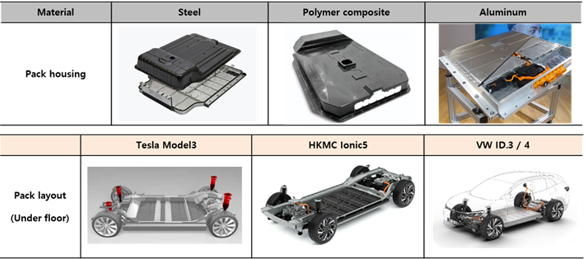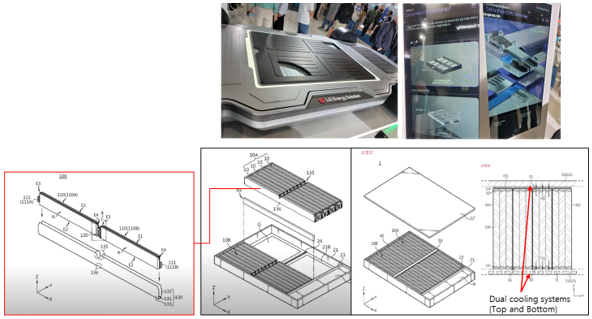Although
the recent slump in electric vehicle sales has slowed things down a bit, the
optimistic outlook for the electric vehicle industry remains.
As
each country strengthens its carbon emissions, automakers will not be able to
afford the penalties imposed by the regulations unless they sell electric
vehicles. Therefore, it is clear that the transition to electric vehicles will
continue. However, since consumers cannot lightly overlook the various negative
views of buyers regarding electric vehicles, electric vehicle manufacturers
have issues to solve, such as easy charging, long driving range, and safety
from battery fires. In particular, the issue of electric vehicle battery fires
is not a simple technical issue, but rather an important issue directly related
to social safety, so it cannot help but be thoroughly verified.
The
EU executive is planning to implement a new battery regulation in 2026, and the
core of this is the Battery Passport. Therefore, battery manufacturers also
need to strengthen battery safety and transparency to respond to international
regulations. Accordingly, this report will examine recent technology trends
in battery modules and packs for electric vehicles, and in particular, examine
the response measures and technologies of each manufacturer related to thermal
runaway.
This
report not only explains the basic concepts of secondary battery packs and the
basic concepts of thermal management, but also describes the battery pack
structure, development trends, and battery pack components, and also analyzes
and summarizes the development status of battery packs according to the major
OEM platforms, major EV electric vehicle battery pack specifications, trends in
battery thermal runaway response technologies, and a detailed description of
the thermal runaway prevention solution (Thermal Runaway Barrier), introduces
major battery pack component companies and thermal management, thermal runaway
companies, and provides an outlook on the EV market, pack market, and thermal
management material market. The last chapter covers the current status and
cases of related battery pack patent trends.
Strong
Points of This Report
① Easy to understand explanation of basic concepts of battery packs
and battery pack thermal management
② Easy to understand pack technology trends of major OEMs such as VW,
Hyundai, GM, CATL, BYD, LGES, Skon, Tesla, and NiO
③ Summary of major EV battery pack specifications (usable battery
pack capacity) and detailed analysis of sales price and energy density
④ Detailed analysis of battery thermal runaway response technology
trends and prevention solutions that have recently emerged as issues
⑤ Detailed information on development trends of domestic and foreign
battery pack component manufacturers and thermal runaway companies
⑥ EV market outlook, pack market outlook, and pack thermal management
material market outlook
⑦ Understanding pack patent trends through patent cases in pack
structural safety, thermal runaway, and CTP fields
[
Battery pack components - pack housing materials ]

[Battery
pack development status according to OEM platform - LGES CTP Technology]

[Thermal Runaway Prevention Solution - TP (Thermal Propagation) Prevention Measures]

1.
Battery pack concept and definition -------------------------- 14
1.1 Basic concept of
battery pack
∙
Meaning of battery pack in electric vehicles
∙
Meaning of battery cell, battery module, and battery pack
∙
Electric vehicle platform and pack, module
∙
Basic configuration of pack in electric vehicle platform
∙
Cell and module connection method (Serial / Parallel)
∙
Battery capacity / Usable energy in battery
∙
Meaning of battery SOC, SOH, DOD
∙
Battery charge/discharge (C-rate)
∙
Battery pack specification
1.2 Thermal
management of battery pack -------------------------- 27
∙
Pack thermal management method
∙
Optimal pack thermal management (design factor)
∙
Cooling and heating method of pack
2. Battery pack structure
and development trends ------------------------- 38
2.1 Battery pack structure
∙
Pack structure (Exploded view)
2.2 Battery pack components
------------------------- 40
∙
Pack housing material
∙
Battery housing application status by xEV vehicle type (Cover, Tray)
∙
Pack Sealing Gasket
∙
Pack Integrity and Validation (CAE, IP test)
∙
CMA (Cell Module Assembly) structure (prismatic, pouch, cylindrical type)
∙
CMA Cover
∙
Compression pad
∙
Cooling system Type 1
∙ Cooling
system Type 2
∙ Cooling
system Type 3
∙ Cooling
system Type 4
∙ TIM(Thermal Interface
Material) configuration and characteristics by material
∙ TIM(Thermal Interface
Material) for module
∙ BMS(Battery Management
System) structure and characteristics
∙ PRA (Power Relay
Assembly)
∙ MSD (Manual Service
Disconnector)
∙ HVIL connector (High
Voltage Interlock connector)
∙ Sensors (Temperature and
current sensors)
2.3 Battery pack development status by
OEM platform ------------------- 64
∙
Concept change of pack by EV platform
∙
Pack features by EV platform
∙ VW’s
MEB platform
∙ Hyundai
Motor’s E-GMP platform
∙ GM’s
Ultium platform
∙ Technology
trends of module-free battery packs
∙ CATL,
BYD’s CTP Technology
∙ LGES’s
CTP Technology
∙ SK
on’s CTP Technology
∙ Tesla’s
New structural battery pack (Cell to Vehicle)
∙ Application
of Hybrid Battery Pack (NIO NCM-LFP
battery cell CTP)
∙ Application
of Hybrid Battery Pack (CATL AB battery
Pack)
3.
Electric vehicle battery pack specification analysis and summary ---------------------
78
3.1
Electric vehicle battery pack specification analysis
3.2
EV battery cell and pack sales price forecast
3.3
Passenger car electric vehicle battery pack average capacity (kWh)
3.4
Electric vehicle battery pack energy density analysis (kWh/kg)
3.5
Electric vehicle battery pack usable energy analysis
3.6
Weight ratio of major battery pack components
3.7
Cost composition of major battery pack components
3.8
Summary of major EV battery pack specifications 1
3.9
Summary of major EV battery pack specifications 2
3.10
Summary of major EV battery pack specifications 3 (Usable battery pack
capacity)
4.1
Thermal runaway phenomenon and causes
4.2
The need for battery pack flame retardancy
4.3
Thermal runaway prevention solutions (Thermal Runaway Barrier)
∙ TP (Thermal
Propagation) prevention measures
∙ TBA (Thermal
Barrier Assembly) applied inside the module
∙ TBA (Thermal
Barrier Assembly) applied outside the module
∙ Characteristics by
TP material
∙ TP solutions at
module and pack levels: Venting technology
∙ Two types of
battery pack venting solutions (Level 1, Level 2)
∙ General design of
battery pack venting (Level 1, Level 2)
∙ Vent application for
De-gas at cell, module and pack level
∙ Key design and
performance considerations
∙ Product requirements:
Level 1, Level 2 venting
∙ Test requirements
∙ Benchmark case analysis
∙ Insulating materials for
Thermal Barriers that can replace Mica
∙ Mica material properties
∙ TRP Paper product
properties
∙ Other alternative
materials
5. Battery Pack Major
Component Suppliers ------------------------ 125
5.1 Battery Pack Component Manufacturers
(Global / Domestic)
∙ KET
∙ Younghwa
Tech
∙ LS
EV Korea
∙ WOORY
INDUSTRIAL
∙ Hyunwoo
Industrial
∙ YURA
CORPORATION
∙ Kyungshin
∙ Mobase
Electronics (Seoyeon Electronics)
∙ Aluco
∙ Hanon
Systems
∙ Saint-Gobain
PPL
∙ INZI
CONTROLS
∙ SEBANG
GLOBAL BATTERY
5.2 Thermal management material manufacturers
∙ Alkegen
∙ Morgan
∙ Rogers
∙ Laird
∙ ASPEN
∙ Pamica
∙ Glory
6. EV & Pack Market
Outlook -------------------- 166
6.1 EV market outlook
∙ Global
passenger EV market outlook by BEV/PHEV
∙ Global
xEV battery demand and outlook
∙ Global
EV battery cell and pack market size
∙ Outlook
by global EV major maker
6.2 Pack market outlook
∙ Pack
market size and outlook for electric vehicles
6.3 Pack component market outlook
∙ Market
size outlook for electric vehicle pack components
6.4 Pack material market outlook
∙ Market
size outlook for pack housing materials
∙ Market
size outlook for pack thermal management materials
∙ Market
size outlook for TP solution materials
∙ Market
size outlook for cell-to-cell structure materials
6.5 Market size outlook for thermal management materials
7. Pack Patent Trends -------------------------
177
7.1 Status of domestic battery company
patent applications
7.2 Domestic battery company patent
cases
∙
Patent cases in the field of pack structural safety
∙
Patent cases in the field of pack thermal runaway

